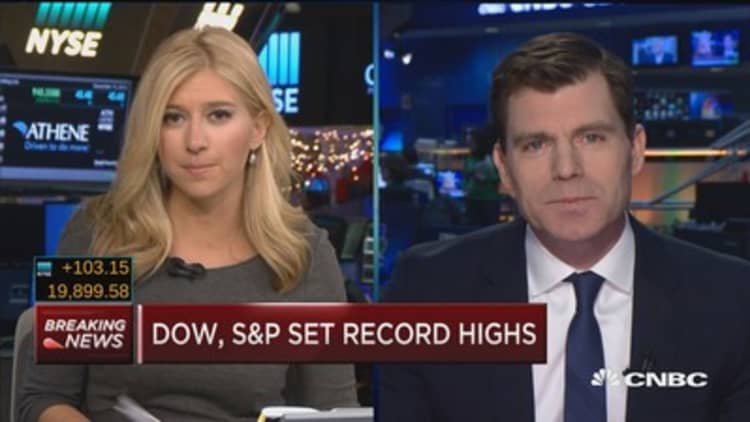
It's getting harder and harder to find a pessimistic investor.
Short interest, or bets made by investors that prices will fall, is moving lower. Among stocks on average, short interest declined from more than 4.5 percent of shares available for trading earlier this year to 4 percent as of the end of November, according to Monday report from Bespoke Investment Group.
That 0.5 percentage point decline may seem small to the novice investor, but it is significant. And the decline has been broad: Short interest fell across almost all sectors, the note said.
"If you continue to see this strong push toward the end of the year, you don't see investors feeling the need to short," said Daniel Deming of managing director at KKM Financial.
"It's certainty versus uncertainty in the market, and right now, right or wrong, the market feels fairly certain about some of the decisions it will have to face," he said.
The benchmark U.S. stock indexes have repeatedly set fresh records after President-elect Donald Trump won the election, as traders bet that his promises of tax cuts, infrastructure spending and deregulation will boost growth. Not only have key indexes such as the S&P 500 set new highs, but the small cap Russell 2000 and Dow transports have simultaneously reached all-time highs.
Mandy Xu, derivatives strategist at Credit Suisse, pointed out in a Monday note that demand for call options, which give the buyers the right to acquire a stock in the future at a pre-set price, have reached an all-time high.
"With U.S. equity markets making new all-time highs post-election, sentiment has turned extremely bullish in the options market," she said in the report. "Not only have demand for calls reached record highs in the S&P, we see this upside chasing across many of the sub-sectors as well."
S&P 500 call demand
Deming said the move in the S&P was "so far, so fast" that it forced options traders into calls, especially ahead of options expiration at the end of the week.
The S&P 500 has climbed more than 5.5 percent since the election and was trading near 2,270 Tuesday afternoon, about 100 points above its 50-day moving average around 2,167.
As another sign that traders are turning more optimistic on stocks, short interest in the energy sector fell below 10 percent for the first time since July 2015, the Bespoke note said. Short interest in the sector hit a high of 12.55 percent as oil prices hit their low point earlier this year, the firm's analysis said.
U.S. crude oil futures traded above $53 a barrel Tuesday after this week hitting their highest since July 2015. The gains came after OPEC and some of its non-OPEC rivals reached their first deal since 2001 to reduce output in an effort to curb oversupply.

Energy and financials have made a stunning turnaround from being two of the worst performers at the start of the year to the top two advancers of the year with year-to-date gains of more than 20 percent each, as of Tuesday.
For the week ended last Wednesday, BofAML said financials stocks saw their 11th straight week of inflows while energy had its largest inflow in 12 months. Equities saw $13.7 billion in inflows to exchange-traded funds (ETFs), and $14.3 billion outflows from mutual funds, the report said.
All that said, the future for stocks may not be as certain as traders are betting right now.
"Whether the rally in U.S. equities will continue remains to be seen, and one of the primary determinants is likely to be further clarity around the new Administration's policies leading up to inauguration day and implementation of that policy thereafter," Chris Johnson, head of U.S. ETF distribution at RBC Capital Markets, said in an email last Friday.


